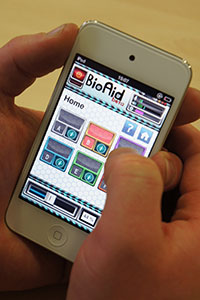
The BioAid app.
Almost 190 people per day are downloading a mobile app that turns an iPhone into a hearing aid, making it the most downloaded medical app in some countries.
In just three months BioAid downloads have risen by 17,000 with feedback from around the world suggesting it is having a revolutionary impact on people’s lives.
The number of downloads of BioAid, which was developed by researchers at the University of Essex and is available free, hit the 18,000 mark last week.
Professor Ray Meddis, of the University’s Department of Psychology, said: “Since April we have had 17,000 downloads from people all over the world. This is part of a research project with the ultimate aim of improving the lives of those who have trouble hearing and we need their feedback to be able to deliver a product that works for them.”
Testimonials on the BioAid website suggest the algorithm behind the app - which, unlike standard hearing aids uses technology inspired by the way the human ear works – is having a profound impact on the way people with hearing loss communicate.
The mother of a young user who has Down’s Syndrome said: “Since downloading the BioAid app on his iPad and iPod, my son is actively taking part in class discussions.”
The son of an 88-year-old user in the USA said: “The effect for him (and for my mother) was dramatic. For the first time in several years…they could now carry on a regular conversation in normal voice, even when sitting about 10 feet apart.”
Unlike standard hearing aids in which amplification is based on engineering principles, the algorithm behind the BioAid app is inspired by biology and replicates the complexities of the human ear. The app puts the user in control, is available to anyone, anywhere without the need for a hearing test, and potentially holds the key to a future where tiny, phone-based hearing aids can be dispensed and adjusted remotely.
Realising the potential of the algorithm behind BioAid, Nick Clark, a Visiting Fellow at Essex and part of Professor Meddis’ team created the mobile app. He hopes this is just the beginning: “There is potentially much more we can do with BioAid. At present, BioAid works only on the iPhone but the possibility of sharing this on cheaper android devices is currently being considered.
“We are also listening to user feedback to see how BioAid can be adapted to help with the communication requirements they have identified. In particular we are hearing from many disadvantaged groups who could benefit such as the elderly, infirm, and isolated, often living in countries where health services are less well developed.”
User feedback certainly suggests the research team has hit upon what could prove to be an important development in the advancement of hearing aid technology with one user commenting: “What distinguishes BioAid from the competition is the availability within the app of multiple settings to meet the needs of different types of hearing loss… In a sense, you have the kind of control over frequency curves that usually only an audiologist would. It works.”
BioAid is available free on the iPhone, iPad and iPod Touch from iTunes. Find out more.
Ends
Notes to editors
For further information please contact the University of Essex Communications Office, telephone: 01206 873529 or e-mail: comms@essex.ac.uk.
Further information, including a video of Professor Ray Meddis talking about BioAid, see: http://www.essex.ac.uk/news/event.aspx?e_id=5095.